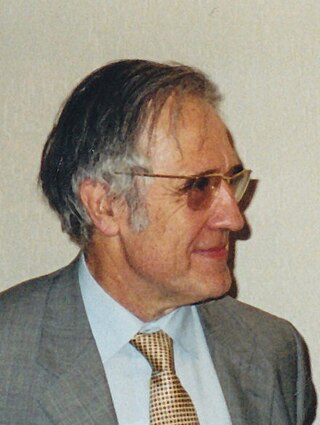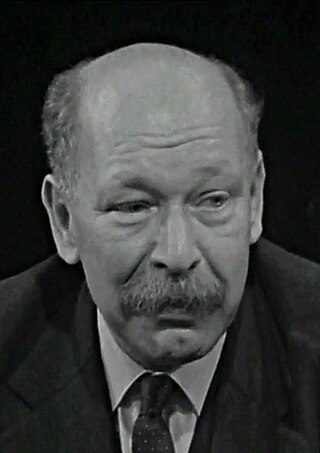Related Research Articles

Edmund Gustav Albrecht Husserl was an Austrian-German philosopher and mathematician who established the school of phenomenology.

Friedrich Ludwig Gottlob Frege was a German philosopher, logician, and mathematician. He was a mathematics professor at the University of Jena, and is understood by many to be the father of analytic philosophy, concentrating on the philosophy of language, logic, and mathematics. Though he was largely ignored during his lifetime, Giuseppe Peano (1858–1932), Bertrand Russell (1872–1970), and, to some extent, Ludwig Wittgenstein (1889–1951) introduced his work to later generations of philosophers. Frege is widely considered to be the greatest logician since Aristotle, and one of the most profound philosophers of mathematics ever.

Arthur Norman Prior, usually cited as A. N. Prior, was a New Zealand–born logician and philosopher. Prior (1957) founded tense logic, now also known as temporal logic, and made important contributions to intensional logic, particularly in Prior (1971).
In logic and formal semantics, term logic, also known as traditional logic, syllogistic logic or Aristotelian logic, is a loose name for an approach to formal logic that began with Aristotle and was developed further in ancient history mostly by his followers, the Peripatetics. It was revived after the third century CE by Porphyry's Isagoge.
David Benjamin Kaplan is an American philosopher. He is the Hans Reichenbach Professor of Scientific Philosophy at the UCLA Department of Philosophy. His philosophical work focuses on the philosophy of language, logic, metaphysics, epistemology and the philosophy of Frege and Russell. He is best known for his work on demonstratives, propositions, and reference in intensional contexts. He was elected a Fellow of the American Academy of Arts & Sciences in 1983 and a Corresponding Fellow of the British Academy in 2007.

Walter Burley was an English scholastic philosopher and logician with at least 50 works attributed to him. He studied under Thomas Wilton and received his Master of Arts degree in 1301, and was a fellow of Merton College, Oxford until about 1310. He then spent sixteen years in Paris, becoming a fellow of the Sorbonne by 1324, before spending 17 years as a clerical courtier in England and Avignon. Burley disagreed with William of Ockham on a number of points concerning logic and natural philosophy. He was known as the Doctor Planus and Perspicuus.

Neo-scholasticism is a revival and development of medieval scholasticism in Catholic theology and philosophy which began in the second half of the 19th century.

Jacques Bouveresse was a French philosopher who wrote on subjects including Ludwig Wittgenstein, Robert Musil, Karl Kraus, philosophy of science, epistemology, philosophy of mathematics and analytical philosophy. Bouveresse was called "an avis rara among the better known French philosophers in his championing of critical standards of thought."
Pascal Engel is a French philosopher, working on the philosophy of language, philosophy of mind, epistemology and philosophy of logic. He was a professor of philosophy of logic at the Sorbonne. He currently works at the University of Geneva, where he collaborates with, among others, Kevin Mulligan. He is a member of Institut Nicod.
Kevin Mulligan is a British philosopher, working on ontology, the philosophy of mind, and Austrian philosophy. He is currently Honorary Professor at the University of Geneva, Full Professor at the University of Italian Switzerland, Director of Research at the Institute of Philosophy of Lugano, and member of the Academia Europaea and of the Royal Swedish Academy of Letters. He is also known for his work with Peter Simons and Barry Smith on metaphysics and the history of Austrian philosophy.
Erotetics or erotetic logic is a part of logic, devoted to logical analysis of questions. It is sometimes called the logic of questions and answers.

Paul Gochet was a Belgian logician, philosopher, and emeritus professor of the University of Liège. His research was mainly in the fields of logic and analytic philosophy. He is perhaps best known for his works on Quine's philosophy.
Philosophy of logic is the area of philosophy that studies the scope and nature of logic. It investigates the philosophical problems raised by logic, such as the presuppositions often implicitly at work in theories of logic and in their application. This involves questions about how logic is to be defined and how different logical systems are connected to each other. It includes the study of the nature of the fundamental concepts used by logic and the relation of logic to other disciplines. According to a common characterization, philosophical logic is the part of the philosophy of logic that studies the application of logical methods to philosophical problems, often in the form of extended logical systems like modal logic. But other theorists draw the distinction between the philosophy of logic and philosophical logic differently or not at all. Metalogic is closely related to the philosophy of logic as the discipline investigating the properties of formal logical systems, like consistency and completeness.
Emil Lask was a German philosopher. A student of Heinrich Rickert at Freiburg University, he was a member of the Southwestern school of neo-Kantianism.

Michel Weber is a Belgian philosopher. He is best known as an interpreter and advocate of the philosophy of Alfred North Whitehead, and has come to prominence as the architect and organizer of an overlapping array of international scholarly societies and publication projects devoted to Whitehead and the global relevance of process philosophy.

Evandro Agazzi is an Italian philosopher and professor at the University of Genoa. His fields of interest are ethics of science and technology, logic, metaphysics, philosophy of language, philosophy of science, philosophical anthropology, and systems theory.
Denis Miéville was a Swiss expert on the logic of Stanislaw Lesniewski and natural logic.

Matthias Schirn is a German philosopher and logician.

Logic is the study of correct reasoning. It includes both formal and informal logic. Formal logic is the science of deductively valid inferences or logical truths. It studies how conclusions follow from premises independent of their topic and content. Informal logic is associated with informal fallacies, critical thinking, and argumentation theory. It examines arguments expressed in natural language while formal logic uses formal language. When used as a countable noun, the term "a logic" refers to a logical formal system that articulates a proof system. Logic plays a central role in many fields, such as philosophy, mathematics, computer science, and linguistics.

Éric Weil was a French-German philosopher noted for the development of a theory that places the effort to understand violence at the center of philosophy. Calling himself a post-Hegelian Kantian, Weil was a key figure in the 20th century reception of Hegel in France, as well as the renewed interest in Kant in that country. The author of major original works, critical studies, and numerous essays in French his adopted language, as well as German and English, Weil was both an active academic as well as public intellectual. Involved in various fecund moments of French intellectual life, Weil was, for example, a participant in the famous lectures given by Alexandre Kojève on Hegel's Phenomenology of Spirit, and would go on to play an instrumental role at the journal Critique during its start and then serve as one of its editors for a number of years. An influential teacher, his students, such as Bourdieu, have noted Weil's formative role in their intellectual development. This influence was also at the origin of the creation of the Institut Éric Weil, a foundation and research library created by a group of his former students after his death.